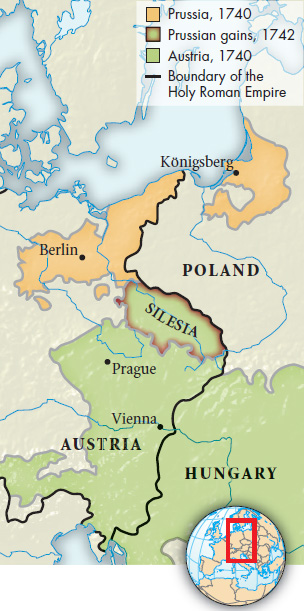Frederick the Great of Prussia
Frederick II (r. 1740–1786), commonly known as Frederick the Great, built masterfully on the work of his father, Frederick William I (see “Prussia in the Seventeenth Century” in Chapter 15). Although in his youth he embraced culture and literature rather than the militarism championed by his father, by the time he came to the throne Frederick was determined to use the splendid army he had inherited.
Therefore, when the young empress Maria Theresa of Austria inherited the Habsburg dominions upon the death of her father Charles VI, Frederick pounced. He invaded her rich province of Silesia (sigh-LEE-zhuh), defying solemn Prussian promises to respect the Pragmatic Sanction, a diplomatic agreement that had guaranteed Maria Theresa’s succession. In 1742, as other greedy powers vied for her lands in the European War of the Austrian Succession (1740–1748), Maria Theresa was forced to cede almost all of Silesia to Prussia. In one stroke Prussia had doubled its population to 6 million people. Now Prussia unquestionably stood as a European Great Power.

Though successful in 1742, Frederick had to fight against great odds to save Prussia from total destruction after the ongoing competition between Britain and France for colonial empire brought another great conflict in 1756. Maria Theresa, seeking to regain Silesia, formed an alliance with the leaders of France and Russia. The aim of the alliance during the resulting Seven Years’ War (1756–1763) was to conquer Prussia and divide up its territory. Despite invasions from all sides, Frederick fought on with stoic courage. In the end he was miraculously saved: Peter III came to the Russian throne in 1762 and called off the attack against Frederick, whom he greatly admired.
The terrible struggle of the Seven Years’ War tempered Frederick’s interest in territorial expansion and brought him to consider how more humane policies for his subjects might also strengthen the state. Thus Frederick went beyond a superficial commitment to Enlightenment culture for himself and his circle. He tolerantly allowed his subjects to believe as they wished in religious and philosophical matters. He promoted the advancement of knowledge, improving his country’s schools and permitting scholars to publish their findings. Moreover, Frederick tried to improve the lives of his subjects more directly. As he wrote to his friend Voltaire, “I must enlighten my people, cultivate their manners and morals, and make them as happy as human beings can be, or as happy as the means at my disposal permit.”
The legal system and the bureaucracy were Frederick’s primary tools. Prussia’s laws were simplified, torture was abolished, and judges decided cases quickly and impartially. Prussian officials became famous for their hard work and honesty. After the Seven Years’ War ended in 1763, Frederick’s government energetically promoted the reconstruction of agriculture and industry. Frederick himself set a good example. He worked hard and lived modestly, claiming that he was “only the first servant of the state.” Thus Frederick justified monarchy in terms of practical results and said nothing of the divine right of kings.
Frederick’s dedication to high-minded government went only so far, however. While he condemned serfdom in the abstract, he accepted it in practice and did not free the serfs on his own estates. He accepted and extended the privileges of the nobility, who remained the backbone of the army and the entire Prussian state.
In reforming Prussia’s bureaucracy, Frederick drew on the principles of cameralism, the German science of public administration that emerged in the decades following the Thirty Years’ War. Influential throughout the German lands, cameralism held that monarchy was the best of all forms of government, that all elements of society should be placed at the service of the state, and that, in turn, the state should make use of its resources and authority to improve society. Predating the Enlightenment, cameralist interest in the public good was usually inspired by the needs of war. Cameralism shared with the Enlightenment an emphasis on rationality, progress, and utilitarianism.